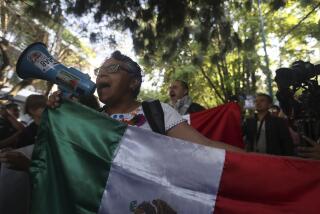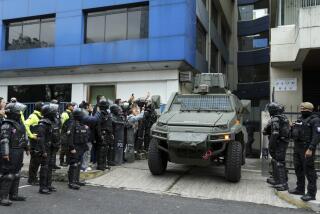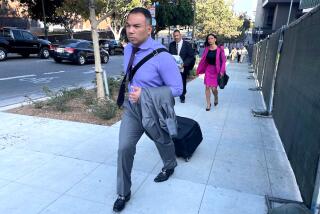Defendant Freed in Camarena Case Returns to Mexico : Courts: Efforts to keep Dr. Humberto Alvarez Machain in Los Angeles fail. Mexican officials hail his release.
President Carlos Salinas de Gortari on Tuesday hailed the release of Dr. Humberto Alvarez Machain as a “correction” of a violation of international law, and the Mexican attorney general said no charges would be filed against Alvarez Machain in Mexico.
In unusually strong language, Salinas accused U.S. prosecutors of slandering Mexican officials as part of their case against Alvarez Machain and co-defendant Ruben Zuno Arce. In sworn testimony, two witnesses implicated a host of high-ranking Mexican officials in the planning of the 1985 kidnaping and murder of Drug Enforcement Administration agent Enrique Camarena.
That testimony, which came from two former bodyguards of a Mexican drug lord, has been denounced by Mexican authorities. “During this aberrant situation, the essence of law was put aside,” Salinas said.
Alvarez Machain, a gynecologist, was acquitted Monday in Los Angeles federal court of participating in the crimes against Camarena. That ruling, by U.S. District Judge Edward Rafeedie, brought an abrupt end to an investigation and prosecution that have strained Mexican-U.S. relations for more than two years.
“The kidnaping of Dr. Alvarez Machain has been a dark page in international law,” Salinas told reporters in Mexico City. “The honest act of a judge allowed for the correction of a violation of law by liberating a Mexican citizen illegally subject to trial in the United States.”
Alvarez Machain was charged with administering an injection of lidocaine to Camarena during his torture to keep him alive so that he could be interrogated further. Alvarez Machain was kidnaped at the behest of the American government on April 2, 1990, outside his Guadalajara office and brought to the United States to stand trial.
Monday, Rafeedie ruled that prosecutors had not presented enough evidence to send the case against Alvarez Machain to a jury. He ordered the physician released, and that order was carried out after an extraordinary last-ditch legal battle in Los Angeles, culminating in a midnight standoff at Los Angeles International Airport. U.S. authorities fought to keep Alvarez Machain in custody, while Mexican diplomats interceded to secure his release.
“There was uncertainty until the very last second,” said Paul Hoffman, legal director of the American Civil Liberties Union’s Southern California office. “This is not the way this case should have ended.”
Alvarez Machain spoke to a Mexican television network after arriving in Mexico City early Tuesday, saying: “I continue to proclaim my innocence. . . . And I have more confidence in my Mexican justice than in U.S. justice.”
Mexican authorities used Alvarez Machain’s return to renew their objections to his 1990 kidnaping. Atty. Gen. Ignacio Morales Lechuga said the Foreign Ministry had been asked to renew its extradition request for DEA agent Hector Berrellez and DEA operative Antonio Garate Bustamante, who allegedly arranged the kidnaping.
Tuesday afternoon, the attorney general’s office issued a bulletin saying that federal attorneys had interrogated Alvarez Machain about his involvement in the Camarena killing and his own kidnaping.
The bulletin said the attorney general had reviewed the cases of all those convicted in Mexico in Camarena’s death and had found nothing linking Alvarez Machain to the murder.
After Alvarez Machain was arrested in El Paso, Tex., by DEA agents, he gave authorities a statement in which he said he had been in a Guadalajara house where Camarena was being tortured and had seen Camarena there. But the Mexican attorney general’s bulletin said Alvarez Machain told authorities “he never knew Enrique Camarena, although under pressure he declared in the United States that he had known him.”
According to the Mexican attorney general, Alvarez told investigators that he was the doctor for drug kingpin Rafael Caro Quintero’s family. Caro was convicted in Mexico for his role in Camarena’s murder.
Alvarez also reportedly told investigators that he had attended parties at Caro’s home but had never seen any of the various Mexican politicians who two witnesses testified were involved in planning the Camarena kidnaping and murder. Among those politicians were former Defense Minister Juan Arevalo Gardoqui, former Interior Minister Manuel Bartlett Diaz and former Jalisco Gov. Enrique Alvarez del Castillo.
A presidential spokesman said the Mexican government’s investigation into Camarena’s death remains open. The attorney general’s office said it is seeking the testimony of several witnesses whose statements, it said, implicated them in the Camarena case.
In addition, Mexican officials said they plan to seek the extradition of Rene Lopez Romero and Ramon Lira, two DEA informants who have admitted involvement in the killing of four U.S. Jehovah’s Witnesses in December, 1984.
Even as the doctor was cleared of wrongdoing by Mexican officials, his co-defendant, Mexican businessman Ruben Zuno Arce, took the stand in Los Angeles for the first time.
Zuno, whose brother-in-law is former Mexican President Luis Echeverria Alvarez, testified for most of the afternoon and vehemently denied the charges that he participated in four different meetings during which Camarena’s abduction was planned.
Zuno portrayed himself as an honest businessman and active citizen.
Immediately after Zuno’s testimony, his lawyers rested their defense.
Miller reported from Mexico City, Newton from Los Angeles.
More to Read
Start your day right
Sign up for Essential California for news, features and recommendations from the L.A. Times and beyond in your inbox six days a week.
You may occasionally receive promotional content from the Los Angeles Times.







